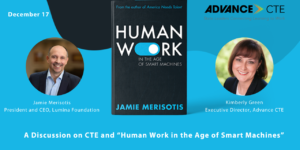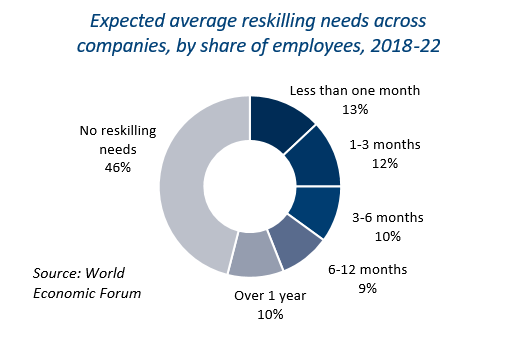 Last week, Advance CTE hosted a discussion with Lumina Foundation’s President & CEO, Jamie Merisotis, on his new book, “Human Work in the Age of Smart Machines” and what it means for Career Technical Education (CTE). The conversation between Jamie Merisotis and Kimberly Green, Advance CTE’s Executive Director, was far reaching, covering topics from how we help learners gain empathy to the unlikelihood of a robot, zombie apocalypse.
Last week, Advance CTE hosted a discussion with Lumina Foundation’s President & CEO, Jamie Merisotis, on his new book, “Human Work in the Age of Smart Machines” and what it means for Career Technical Education (CTE). The conversation between Jamie Merisotis and Kimberly Green, Advance CTE’s Executive Director, was far reaching, covering topics from how we help learners gain empathy to the unlikelihood of a robot, zombie apocalypse.
A couple of key points that really stood out to me were:
- The need to break down the silos of “education” and “training.” As Merisotis put it: “Neither training devoid of broader learning nor education devoid of preparation for work is going to get people what they need.” The false dichotomy that training prepares people for work and education is a more “pure” endeavor is simply holding us back and making our systems less cohesive and responsive.
- The importance of building deep and abiding service into our education pathways and workplaces. This goes beyond requiring or offering community service within a CTE program or as a corporate social responsibility effort, but rather making service part of the overall lifelong learning experience. By engaging directly with those being impacted by one’s work, individuals can gain empathy and understand how to better support and serve clients going forward.
- Everything we build as advocates, policymakers, industry partners or practitioners needs to have a racial equity lens. If we don’t address racial equity head on – as we have failed to do for decades – the inequities and systemic racism will only worsen.
- No, the robots are not coming to take all of our jobs! Technology always creates more jobs than it destroys and supports a broader “cycle of creative destruction and renewal,” according to Merisotis. CTE must continue to be nimble and focus on those skills, competencies and functions that are uniquely “human,” including how to work along side technology.
Following the discussion, Advance CTE members broke into small-group discussions to unpack the conversation and reflect on what it meant for them and their CTE programs and policies. One discussion focused on CTE’s role in the future of work and how CTE is well positioned to take on a stronger role in these conversations given our positioning at the nexus between education and industry. CTE should be spearheading these conversations and intentionally engaging with employers to discuss how they can value their human workers differently.
There was also some healthy discussion around how prevalent “human work” will be in the future, given how many examples we still see of human work being devalued in our current workforce and economy and the ever-growing attention to being more efficient and productive and the work regularly being shifted to machines.
Finally, members dug into the challenges related to technology, recognizing we still have a lot to learn about the role of technology in teaching and learning. We need to work through the ongoing fear many have of technology and what it means for work in the future, how much the CTE field still needs to learn about emerging and cutting-edge technologies, and the fact that technology was not in place to support the transition to remote learning during COVID-19. Members also discussed the importance of ensuring equity is attended to in the design of new technologies. For example, we must have measures in place so that the algorithms within artificial intelligence programs are not perpetuating discrimination or inequities.
A special thank you to Jamie Merisotis and his team at the Lumina Foundation for partnering on such a great event for Advance CTE members!
View the recording of the full discussion here.
Kate Kreamer, Deputy Executive Director


 The answer is, it’s complicated. According to the
The answer is, it’s complicated. According to the